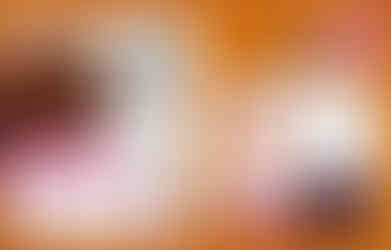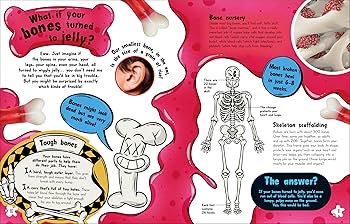That is sooooo revolting...!
- armadilloeditor
- Sep 4, 2025
- 6 min read
Discover more about the author and the inspiration behind a revolting and simultaneously fascinating book... Just make sure you aren't eating as you read...!
The entire book is a series of ‘What if…’ questions followed by great answers filled with balanced science and succinct enough for young people to understand. What do you think is so appealing about this format and what are the challenges of creating within it?
I felt that asking a series of ‘silly’, sometimes slightly outrageous questions could be a great way to hook kids into wanting to read really important material about their body. (And, in later books in the series, about the Earth, animals and space.) Keeping the text blocks brief and making sure we had striking photos and fun, cheeky illustrations (which were so brilliantly provided by Superfreak), were really important for that accessibility, too.
The main challenge was balancing the fun aspect with getting the key information across. I really wanted the book to be educational — much more than just a series of quirky facts.
Did you start off with a list of all the ‘What if…’ questions that you wanted to ask – was there a personal favourite and were any excluded from the final book?
I did! I wrote down a really long list of absolutely every fun hypothetical question I could think of about the human body. I did some whittling, then my editors at DK got involved, to make sure we were covering all the main human body bases. My personal favourite is probably, ‘What if you only ate cockroaches for a year?’ It has the ugh factor - which was so appealing to my kids when they were younger - and, for me, was such a fun way to get into the serious topic of nutrition.
Does your favourite ‘What if…’ make you wish that it was really possible, knowing the science behind it!
Ha! Though the consensus from medical experts that I spoke to was that you would still be alive, I’m going to say: definitely not! I can’t think of any creature that I find more off-putting than cockroaches. I lived in Sydney, Australia, for a long time and my cute little cavapoo dog would come in from the garden with cockroach legs sticking out of her mouth. Maybe it was that that gave me the idea about having to eat them!
We are all fascinated by the human body and how it works. What was it that encouraged you to pursue a career in science and are you a human biologist?
I’m not a biologist. Biology and English were my favourite subjects at school, though - and after a science degree, I became a science and medical reporter. I’ve written about cutting edge science and medicine for national newspapers and magazines for more than two decades now, and I still love it. Communicating fascinating, important new discoveries accurately but in a really accessible way is something I really enjoy. This book is an extension of that, but for kids.
Having said that, because I’m not a biologist or a doctor, there were several questions that I just couldn’t answer through my own research — and it was really important to me that all the answers should be accurate. So, because I’m a journalist and used to asking experts for help, I took them to friends with the necessary expertise. A paediatrician, a GP, a dermatologist and a paediatric dietician all kindly helped me.
There’s a nice balance between What if’s that suggest wanting: e.g. the bowl of grass and not wanting, e.g. not wanting to sweat. How important is the distinction?
That’s a lovely insight. To be honest, I hadn’t thought about that. For the book, it’s probably not that important in the end, but yes, children’s lives are full of lots of wants (tasty food, enough water, to be able to play) and things they do but don’t like - and don’t necessarily understand why it’s so important for their survival (like sweating a lot, and vomiting!)
Do you think the best way for science to appeal to younger readers is through humour or it that just the way in, one way to grab their attention?
I think that for this age group, humour is a great way to hook them in — but after that, I did try to keep humour in the text, too. So much of what they learn at school is so dry. (I say that as the mother of two boys, both still at school.) Humour can make educational material more engaging, and I’m positive readers will be more likely to remember the key facts, too.
What was it that originally drew you to science, did one branch have more appeal than others? When did your career move into science reporting or was that always your plan?
I loved biology and chemistry as a kid. As an adult, I’m really interested in all science. It explains why our world and everything in it is the way it is, and gives us tools to change it - if explained well, I think everyone would be really interested in that.
I did think about going down an academic route, but being a science journalist allowed me to become a complete magpie, hopping from one incredible discovery or development to another. One of the best things about being a science reporters is that I can call up world experts in any field, and they’ll (usually!) be happy to talk to me. I get to find out about the very latest work and breakthrough discoveries in whatever area I’m interested in. It’s impossible to get bored.
Do you think that many of these ‘What if…’ questions are simply curiosity or are any of them questions with answers that can make a real difference to us as humans?
I hope that they will help readers to better understand their remarkable bodies. I made sure they all had a serious element to them. For example, the question ‘What if you couldn’t fart’ had a gory answer, but discussed gut bacteria and what happens in the large intestine.
Some of the information in the book is quite revolting, for example that we are all snot swallowers! Is this something you think children need to know, will love and hate at the same time and will keep them interested rather than put off?
Young kids are really interested in their bodily effluvia, if I can put it that way! But snot, vomiting, farting, poo and wee are, of course, really important bodily products and processes, so a book on the human body shouldn’t ignore them — and I think (I hope) these questions will help to keep them interested and engaged in the book. And which kid hasn’t thought, ‘Do I really need to have a shower?’ when told to by a parent. The question, ‘What if I never washed again?’ explains why it’s important!
You’ve managed to make the explanations for each question concise, clear and easy to understand. Are there any human biology topics which make that very difficult?
Thank you. I think I’ve spent so many years as a reporter striving to making difficult topics accessible that for me, there weren’t any that topics that were particularly difficult.
What us your favourite ‘What if…’ and why?
Please see above - I think the cockroach one.
What is your favourite science fact?
That’s a tough one! Given what I do, it changes all the time. Right now, I’m working on something on animal intelligence. That fact that honeybees are probably conscious is a pretty striking one to me. But if you asked me next week, I’d probably give a different answer!
My thanks to Emma Young for such brilliant answers to my questions and for creating the first in what promises to be a series of fantastic What If... Books. Thanks also to Natasha Finn at DK for making all this possible.
What If You Didn't Make Snot is out now and can be found at all good booksellers. The next title, What If Every Volcano Erupted At Once is due out in November - watch this space! Head over to Armadillo Magazine to read my review of the current title which is my Book O' The Week.

.jpg)














































Comments